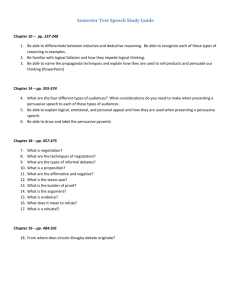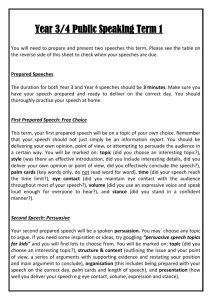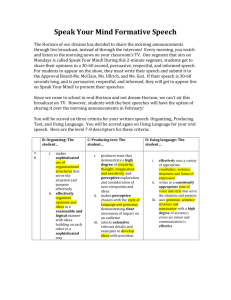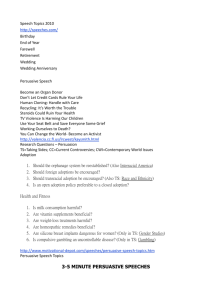2012 spring syllabus at LAVC
advertisement
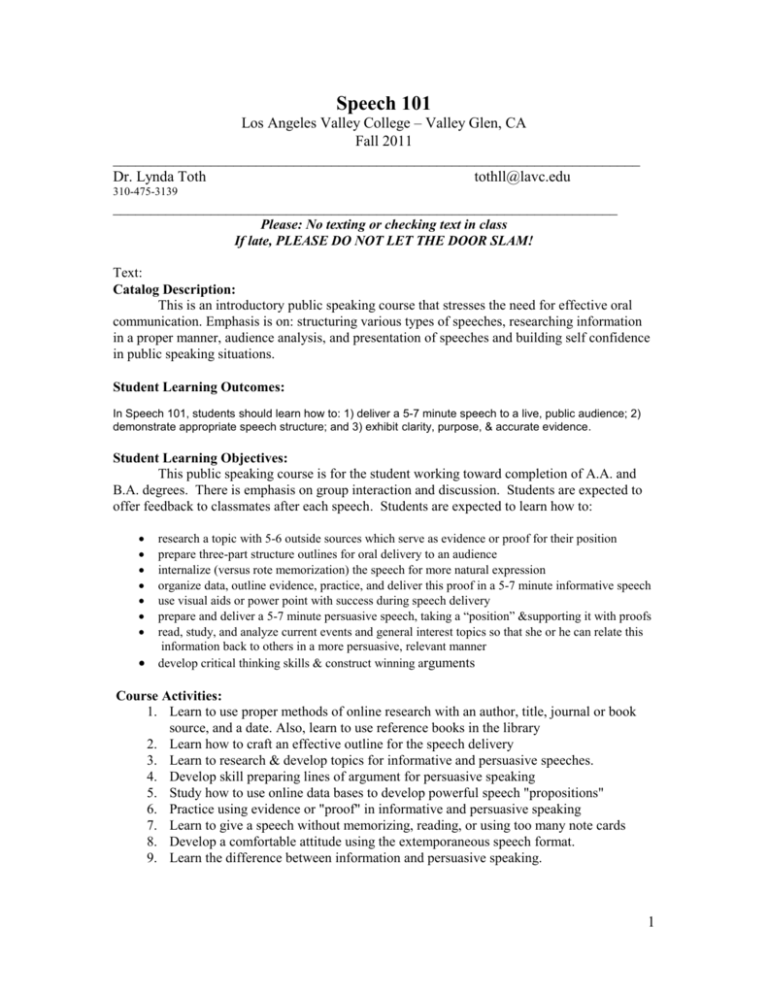
Speech 101 Los Angeles Valley College – Valley Glen, CA Fall 2011 ______________________________________________________________________ Dr. Lynda Toth tothll@lavc.edu 310-475-3139 ___________________________________________________________________ Please: No texting or checking text in class If late, PLEASE DO NOT LET THE DOOR SLAM! Text: Catalog Description: This is an introductory public speaking course that stresses the need for effective oral communication. Emphasis is on: structuring various types of speeches, researching information in a proper manner, audience analysis, and presentation of speeches and building self confidence in public speaking situations. Student Learning Outcomes: In Speech 101, students should learn how to: 1) deliver a 5-7 minute speech to a live, public audience; 2) demonstrate appropriate speech structure; and 3) exhibit clarity, purpose, & accurate evidence. Student Learning Objectives: This public speaking course is for the student working toward completion of A.A. and B.A. degrees. There is emphasis on group interaction and discussion. Students are expected to offer feedback to classmates after each speech. Students are expected to learn how to: research a topic with 5-6 outside sources which serve as evidence or proof for their position prepare three-part structure outlines for oral delivery to an audience internalize (versus rote memorization) the speech for more natural expression organize data, outline evidence, practice, and deliver this proof in a 5-7 minute informative speech use visual aids or power point with success during speech delivery prepare and deliver a 5-7 minute persuasive speech, taking a “position” &supporting it with proofs read, study, and analyze current events and general interest topics so that she or he can relate this information back to others in a more persuasive, relevant manner develop critical thinking skills & construct winning arguments Course Activities: 1. Learn to use proper methods of online research with an author, title, journal or book source, and a date. Also, learn to use reference books in the library 2. Learn how to craft an effective outline for the speech delivery 3. Learn to research & develop topics for informative and persuasive speeches. 4. Develop skill preparing lines of argument for persuasive speaking 5. Study how to use online data bases to develop powerful speech "propositions" 6. Practice using evidence or "proof" in informative and persuasive speaking 7. Learn to give a speech without memorizing, reading, or using too many note cards 8. Develop a comfortable attitude using the extemporaneous speech format. 9. Learn the difference between information and persuasive speaking. 1 Specific Class Goals & Tasks 1. Deliver 7 speeches. Graded speeches should be 5-7 minutes in length. 2. Speeches need to be delivered on time manner. 3. Complete two speeches using data base research or library sources with validated sources as footnotes in a formal bibliography. 4. You must footnote your sources. Do not put web addresses. 5. Provide author, date, title, source, pages just as you would for an English essay. 6. Buy a footnote style sheet at the LAVC bookstore or online. (Modern Language Association or American Psychological Association format.) 7. All outlines should be typed. No handwritten work is accepted. Please label all speech outlines ("Informative, "Persuasive," etc.). 8. Speech outlines start with the Teaching speech. 9. Always put your speeches on a flash drive for Power Point presentations in case your laptop will not perform. Your speech can thus be accessed elsewhere. 10. Power Point is an option, but only for the last two speeches. Bring your own laptop if possible. Always backup work. Check it before you leave home. 11. All speeches require professional “looking” visuals. Do not cram all your information on one poster board. Cut the poster board into pieces and put one fact on one, smaller poster board. Avoid being “cheap” with your efforts. Speech Topics: “Introduction” speech (not more than 60 sec.) No outline needed. “Dinner” speech (about 90 sec.) No outline needed. “Concerned” speech (about 90 sec.) No outline needed. “Teaching” speech, (3-5-minutes) you’re the teacher. Outline & visuals required. “New Information” speech (5-7 minutes with 5 cited footnotes.) Outline. “Persuasive” speech (5-7 minutes with 5 cited footnotes.) Outline. Grades and Attendance: Grades are dependent on individual progress. Please do not look at other people's grades. This would be like using someone else's dental records. You are in competition with where you started in the class. We build on that and work with you as an individual. The final grade is based on personal, steady improvement and response to professor in class oral and written feedback on the outlines. Always get your outline back from the professor and keep it to prove your grade as well as remind yourself where you need to improve your speaking. Three or more absences may lower your grade one level or exclude you from the course. The persuasive delivery is your final exam and most important speech. Students who begin missing one class a week or two absences in a row will be dropped from the roster. Such behavior demonstrates an unacceptable attitude toward their fellow classmates and the course. It is crucial for you to be present everyday to get the feedback on speeches from the professor and the student audience. Notify the professor if you are in the hospital or have a written doctor's excuse for absence. 2 Rules & Regulations: 1. When entering the class, please use the back door and DO NOT LET IT SLAM, especially when another student is speaking!!! 2. No "texting" in class. Please do not make me the "bad guy" here. 3. The College allows me to exclude you after the 3 unexcused absences. Attendance is critical for an “A” or “B” grade in this class. 4. Please attend class even when you “are not up to speak.” 5. If this is unsuitable, perhaps you should postpone this class until you can meet these regulations. 6. Please do not arrive late and leave early. If you stop coming to class, drop the course yourself. Failure to do so may result in a failing or “F” grade. 7. Please conduct yourselves in a quiet, orderly manner especially when classmates are speaking. Do NOT giggle with a friend. The speaker will assume you are laughing at them. Office Hours: The best way to reach me is between 6:00 am – 7:00 am by telephone. Always by email. You may also make an appointment to meet in Humanities 108 on campus. Use the telephone for faster service when there is a pressing problem. (310-475-3139) Speak slowly and clearly. Repeat your number twice. My digital device will cut off the last number or two if you click off too fast. I will return your calls as soon as I can. I have "high hopes" for this class because tomorrow belongs to you! Remember: learners today, leaders tomorrow! 3

